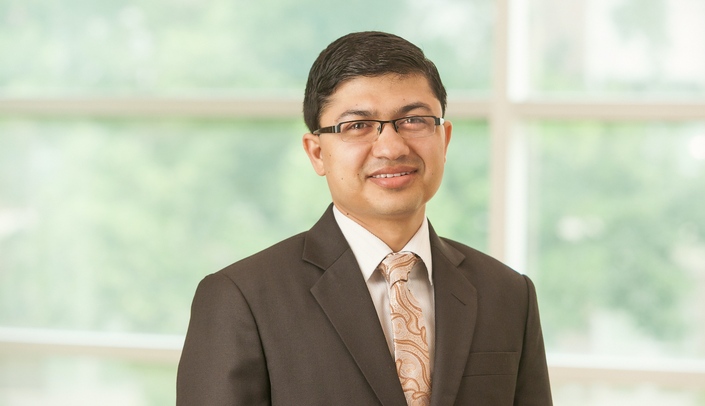The survival statistics of older adults over age 60 with acute myeloid leukemia (AML) – are not good due to age factors and the nature of the disease. A clinical research study at the University of Nebraska Medical Center is trying to improve survival.
“This is a tough disease,” said Vijaya Raj Bhatt, M.D., UNMC associate professor and medical director of the leukemia program for Nebraska Medicine, UNMC’s clinical partner. “One of the biggest challenges is how to determine what treatment patients should get.
“In the past, the question was which patient should get more aggressive chemotherapy versus less aggressive chemo. The more aggressive therapy can work faster, but it also can make people sick and not be able to tolerate it. That is the question that our study revolves around.”
Dr. Bhatt said the goal of the study is to find a systematic way to determine who may or may not tolerate intensive chemotherapy. He said in the last two years, the Food and Drug Administration has approved eight new medications to treat AML.
“We have not known very well how to choose one treatment over another,” said Dr. Bhatt, principal investigator of the clinical research study. “Having new medicines adds complexity, so we will try to determine how to personalize treatment. Our goal is to translate into more people living longer and making their quality of life a bit better.”
Dr. Bhatt said he and his team will consider a patient’s treatment depending on what type of AML they have – as well as their physical, mental and social health.
“On average, one in four older adults don’t get chemotherapy,” Dr. Bhatt said. “One of the concerns is that older adults might have more complications. But if we could personalize treatment and reduce toxicity, it may increase overall use of chemotherapy, which may mean an increase in survival.”
Researchers plan to create an algorithm to tailor treatments as well as evaluate study participants’ quality of life, how much toxic effect they experienced with treatment, and survival. They hope to enroll up to 75 patients in the five-year study, which has been going on for more than 18 months.
The grant is funded by the Great Plains IDeA-Clinical and Translational Research Network.
Dr. Bhatt said there are a few reasons why those 60 and older get worse leukemia than younger people. One is that chemotherapy is underused. Study participants can continue to see their local oncologist while enrolled in the study, he said noting that UNMC is recognized around the world for its excellence in treating leukemias and lymphomas.
See a recent publication by Dr. Bhatt on the personalized approach to treatment of older adults with AML at https://www.sciencedirect.com/science/article/pii/S0305737219300532.
ADDITIONAL quote
“Curing leukemia in older adults is very difficult because of the nature of leukemia. How leukemia behaves is determined by genetic and mutation changes. Older adults are more likely to have negative genetic changes and mutations and are more likely to develop leukemia after treatment or radiation for a different cancer or they’ve had chronic blood cancer that becomes acute leukemia. It’s difficult to attain remission and even if remission is achieved, many times it comes back. Hence, treatment of older adults should be tailored and blood or bone marrow transplant should also be considered as a part of treatment.”
Vijaya Raj Bhatt, M.D., University of Nebraska Medical Center associate professor and medical director of the leukemia program
We are Nebraska Medicine and UNMC. Our mission is to lead the world in transforming lives to create a healthy future for all individuals and communities through premier educational programs, innovative research and extraordinary patient care.
Twitter | Facebook | Instagram | YouTube | Flickr
Clinical study looks to improve survival of older patients with leukemia
- Written by Vicky Cerino
- Published Jul 3, 2019

Media Contact
Vicky Cerino
UNMC Strategic Communications
(402) 559-5190
(402) 559-4353
vcerino@unmc.edu